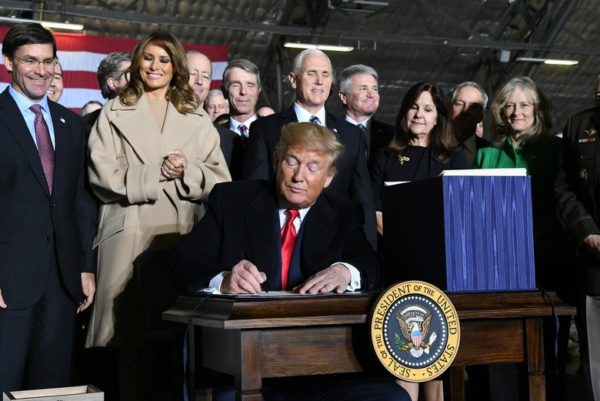On June 17, the first tranche of the largest US sanctions applied so far to Syria entered into force. United States President Donald Trump signed the “Caesar Syria Civilian Protection Act of 2019” on December 20, as part of the National Defense Authorization Act of 2020, into law on December 20. First introduced in 2014, the law was the result of testimony given to Congress by a forensic photographer, a defector of the Syrian government codenamed Caesar, namesake of the law. Caesar left Syria in 2013 bringing 55,000 photographs of mass torture and death to Syrian government prisons. The law adds to the long line of economic sanctions already imposed on Syria by the United States, the European Union and many other countries including Canada, Japan, Turkey, Switzerland and the Gulf countries.
The Caesar Act imposes sanctions on institutions and individuals from countries other than the United States who carry out specific commercial activities with the Syrian regime including Iranians, Russians, Lebanese etc. It includes “travel restrictions to the United States and isolation from the United States’ financial system for foreign persons who engage in or finance the obstruction, prevention, or disruption of a ceasefire or political solution to the conflict in Syria and members of their family, among other actions. Mandatory sanctions under the Caesar Act target foreign persons who facilitate the Assad regime’s acquisition of goods, services, or technologies that support the regime’s military activities as well as its aviation and oil and gas production industries. The Caesar Act also mandates sanctions on those profiting off the Syrian conflict by engaging in reconstruction activities “. The administration will impose sanctions also on entities owned or controlled by the government, or on mercenaries and paramilitary actors affiliated to the regime including forces affiliated with Russia and the ‘Iran. The act will place serious obstacles to the plans of the various Gulf countries or China for reconstruction, but above all the United Arab Emirates, which have already begun diplomatic relations with the Assad regime.
But the Caesar Act is targeted. It wants to avoid penalizing humanitarian assistance, including medical supplies and food for civilian use and the effects on people and activities that have no commercial relationship with the regime. Although from a practical point of view, it is still to be understood how.
Having mainly an economic rather than military character, the pressure of sanctions will affect above all relations between Syria and Lebanon. The act will drastically reduce the regime’s ability to use Lebanon’s economy as a channel. Syria’s economy has always been linked to that of Lebanon. Since the mid 1950s, Lebanon – especially its banking sector – has allowed Syria to conduct its commercial and financial transactions. Lebanon was the gateway to the Syrian economy to the outside world. And even now, although there are no diplomatic ties, the two countries have strong economic relations. Through the Lebanese banking sector, Syria managed to reverse the sanctions imposed on Damascus after 2011. Lebanon is the place where many Syrians have their savings, while its banks have permitted through credits to the Syrian traders to import goods in their market.
Syria still sells electricity to Lebanon. Trade, particularly through smuggling, has been a profitable undertaking for members of the Syrian regime and for traders on both sides of the border. The remittances of Syrian workers in Lebanon have been an important voice in the Syrian economy. And it is clear that the economic crisis that Lebanon has been going through has repercussions on Syria, a country torn apart by the war and corruption of a regime that tries to survive by all means. Lebanon is experiencing one of its strongest economic crises, precipitating rapidly since October 2019 when protests began. Covid has given another boost. The Lebanese lira has lost more than 60% against the dollar. The Lebanese government is currently negotiating with the International Monetary Fund for a $ 10 billion aid package.
The Caesar Act is a strong tool that reinforces the idea that the Lebanese economy cannot act as a support economy for the Syria-Iran axis. Lebanon can no longer be tied to the current Syrian regime if it wants to avoid total economic collapse and wants to have access to the IMF aid package. Clearly, the act is an instrument of pressure on Hezbollah, which is one of the allies of the Syrian regime, and which controls the border crossings of smuggling with Syria: smuggling fuel to Syria and arms smuggling to Lebanon. The sanctions will affect Syrian personalities or businessmen who live in Lebanon and have ties to the regime, the Lebanese companies that trade with these companies and all the Lebanese individuals or entities that provide assistance to the Syrian regime. There is no doubt that the Caesar Act on the one hand is a strong deterrence for anyone wishing to be part of the reconstruction in Syria, but also an opportunity for Lebanon to start thinking about what the country’s priorities really are. Certainly miracles cannot be expected from a government that in practice is controlled by Hezbollah, but the sanctions will push Hezbollah to be cautious and perhaps the Army to try to limit its smuggling activities by strengthening and taking control of the country’s borders.
Author
-

Researcher on International Relations Middle East and Balkans
View all posts
CSSII- Centro Interdipartimentale di Studi Strategici, Internazionali e Imprenditoriali,
Università di Firenze, Italy, Albania




